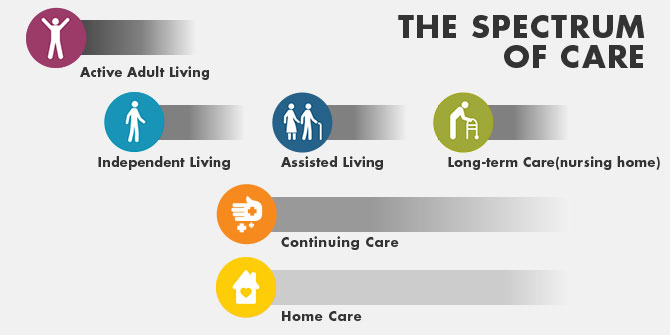Lists of reports on this page:
Find care details, insights, and insider perspectives gained from 20+ years of helping seniors and families.
What to know about this topic:
- Types of senior care in Guelph
- How much does a retirement home in Guelph cost?
- Medical and saftey services for Guelph seniors
- Recreation and social activities in Guelph
- Transportation for Guelph seniors
- How to choose a retirement home
- Guelph retirement community regulations
The city of Guelph is located in the heart of Wellington County in southern Ontario, and is consistently ranked one of the best places to live in Canada. Guelph boasts critically acclaimed restaurants, a number of National Heritage sites and a beautiful natural setting. 122,000 residents enjoy a clean environment, low crime rate and high standard of living -- making it a great place to be in a retirement home.
There are a number of excellent retirement homes in Guelph, which also serve the surrounding towns of Arkell, Puslinch and Marden. This is your guide to finding the right community and care in Guelph.
IN-DEPTH REPORTSRetirement communities in Guelph
The Village of Riverside Glen
This elegant Guelph retirement home offers a range of care including assisted living and long term care, serviced by a friendly, caring staff.
Lifestyle Options: Assisted Living, Memory Care, Long-term care
The Village of Arbour Trails
Guelph retirement home offers Independent Living, Assisted Living and Memory Care. Includes 24 hour onsite nursing team and medication support within a Village-like setting. It takes a Village to care.
Lifestyle Options: Independent Living, Assisted Living, Memory Care
Types of senior care in Guelph
In Ontario, three main types of communities exist on the spectrum of care: Independent apartments, assisted living complexes, and long-term care homes, all of which are available in Guelph (see image below).

Independent and Assisted Living
Most of Guelph’s retirement homes offer a continuum of care where seniors can live as independently as they like or, if needed, take advantage of the assisted living services provided. These communities offer everything from light housekeeping and recreational facilities to meal and laundry services, medication supervision and personal care. The best thing about retirement communities that provide both independent and assisted living options is that residents can remain in their new home, surrounded by familiar friends and facilities, as their care needs change.
Assisted and independent living communities are sometimes organized as apartment style living, but can also be set up as villages with individual homes and a small-town feel.
Long-term care
For seniors with more serious health concerns or cognitive disabilities such as Alzheimer’s or dementia, long-tem care communities will provide more comprehensive care. These residences ensure seniors remain safe in a secure community that is comfortable, familiar and home-like, while meeting their unique physical, social and health needs.
Guelph area retirement homes offer superb care for those who suffer from Alzheimer's Disease and related dementias (including Parkinsonian, Lewy Body and others). Alzheimer’s Disease, a degenerative brain disease (and the most common form of dementia), robs sufferers of normal mental functioning and affects memory. For those who are in advanced stages of the disease and on a waiting list for long-term care, a stay in one of the excellent private memory care facilities in Guelph can offer profound peace of mind for family.
How much does a retirement home in Guelph cost?
The monthly cost of a retirement home in Guelph varies with the type of suite and amount of added care you or your loved one decide is the right fit. A typical room in a Guelph residence costs slightly more than the provincial average of $3,200 per month, and additional fees can come from television, meal and personal laundry services as well as optional services such as foot-care and dentistry.
As a whole, Ontario’s retirement homes are well regulated, safe and welcoming – unfortunately this also renders vacancy rates relatively low. Over the last few years, the vacancy rate has dropped to about 13 percent. Making the decision to move to a retirement community is a big decision, and once it is made you or your loved one may have to spend time on a wait-list before being accepted. Certain factors will inform the length of wait times and costs:
- Crisis placement (if someone’s safety poses immediate risk)
- Type of accommodation: basic, semi-private or private or secure floor (Private or semi-private are more expensive but have shorter wait-times)
- Gender
- Medical care needs i.e. tube-feeding
- Unit designation- secure, non- secure
Affordable housing is also an option for Guelph seniors who are looking to downsize, or have encountered financial trouble, but still wish remain in a home of their own. The Guelph Non-profit Housing Corporation owns and manages 512 geared to income units, s well as 33 affordable rental-housing units located in the city.
Some of the most common ways of paying for retirement are through savings, pensions, Canadian Pension Plan (CPP) and Old Age Pension. The sale of the family home is also a good way to finance retirement costs.
The Ontario government can also be helpful when it comes to additional expenses, such as home care or prescription expenses. Seniors with high prescription drug costs relative to their income may benefit from applying to the Trillium Drug Program. Seniors over the age of 65 who live in Ontario and have a valid Ontario health card are eligible for application.
Medical and saftey services for Guelph seniors
Seniors make up nearly 13 percent of the population of Guelph and Wellington, a number that is set to grow in the next decade. As a result, the area has a number of services and facilities geared towards senior health, safety and wellness. Evergreen seniors centre is a popular destination for Guelph’s seniors, and provides opportunity to be social and get involved.
Guelph General Hospital, St. Joseph’s Health Centre Guelph and Homewood Health Centre are all just a short drive away from Guelph’s retirement homes. In case of an emergency, trained staff is always at hand to make sure residents get the help they need. Pharmacies, physiotherapy and massage therapy and chiropractic clinics are also located all around the Guelph area.
It's good to know that during an emergency, hospitals are close by, however, modern retirement residences no longer need to outsource most of their resident’s health care. Instead, today’s retirement homes are equipped with health teams consisting of regular doctors, registered nurses, and personal care workers and nursing aids. Residents can take advantage of the many preventative health care options offered in their communities, and, at some residences, can even change their family doctor to the on-site or visiting doctor. Some of the preventative health care services provided by professionals in Guelph’s assisted living communities include:
- 24/7 nursing care
- Medication assistance services
- Exercise programs with access to a personal trainer
- Physiotherapy
- Preventative wellness programs
- Recuperative programs
- Assistance with daily living activities
- Monitoring of blood pressure and blood sugar
- Therapy options e.g. Music and Aroma therapy
- Palliative care services
- Emotional, cognitive and social support
Long term-care, also known as extended or residential care, offers all of the above, as well as more tailored care to those seniors with complex medical needs and/or advanced stages of Alzheimer’s and Dementia and more comprehensive assistance with daily activities, including:
- Assistance with walking
- Personal care with dressing, feeding and hygiene
- Pain and symptom management
- Advanced Alzheimer’s and Dementia therapy and care
- Continence care
Suites are often equipped with safety measures such as non-slip floors, oversized, sit-down showers, bathrooms with grab bars and night lighting to make living comfortable and keep seniors safe. In the event of an emergency, emergency-call systems are located in every room and will alert staff immediately at any time of the day or night.
In addition to medically trained staff, most retirement homes employ a number of professionals responsible for the meals and activities provided to residents. Dietary staff members make sure meals are both healthy and delicious, and can tailor their meals to specific needs. Activity directors and recreational staff are charged with organizing outings and using residence facilities to their full potential for the benefit of residents.
Additional services are available is many residence, such as foor care. Some villages even feature hairdressing, dentists and park-like grounds on the property for resident wellness.

For seniors living at home, there are also anumber of home health care and assistance programs in place. Private companies can help with anything from light housekeeping to personal care, as well as home maintenance and meal delivery. Volunteers from organizations such as the GSWA also help seniors in the community maintain a safe and clean living space and provide companionship to lonely seniors.
Caregiver health, of course, is just as important as patient health. The services listed above, as well as support groups and help from organizations such as the Waterloo-Wellington Alzheimer’s society can assist caregivers with their responsibilities and help them remain socially and mentally healthy. Many retirement residences also provide opportunities for overnight respite, giving caregivers a night off, and seniors a night out in a home away from home.
Recreation and social activities in Guelph
Guelph is a city full of natural beauty, art and history, and in turn, the city’s retirement residences are lively and creative communities. While retirement homes have their own internal programs and resources to ensure the health of residents and encourage a vibrant lifestyle, they also work with the city’s community and health care centres to connect residents to the arts, culture and history Guelph is so rich in.
Well-run retirement residences encourage residents to stay creative and continue to express themselves. One Guelph retirement village went so far as to transform their property into a masterpiece gallery, where residents, family and friends from six different villages across Ontario gathered to enjoy a splendid showcase of art, music and fine food, featuring performances and works by residents.

While the opportunities to showcase existing talents and hobbies are numerous for Guelph seniors, so are the chances to develop new ones.Dance and art classes as well as a variety of sports, gardening and card clubs and many more recreational programs are offered to seniors by both retirement residences and community centres.
Many retirement homes try to connect with community centres to give their residents more access to recreational facilities and programs. Volunteering, many recreational programs, and rentable rooms for seniors groups are all features of the Evergreen Seniors Centre, which is open to all seniors in the community. A full list of programs can be found in Guelph’s Leisure Guide.
The Guelph Wellington Senior Association is also a prominent contributor to senior health and safety in the city. The association is one of the largest of its kind in Canada, with more than 2,500 members. The GWSA partners with the Evergreen Seniors Centre, but it operate in four different locations, offering everything from computer courses and arts classes to fitness programs and retirement adjustment. Approximately 500 volunteers from the Wellington area help to run the over 90 programs currently available.
Seniors can continue to explore Guelph’s arts scene by visiting the city’s theatres, art galleries and concert halls, and the architecture of the city is also worth visiting. The Church of Our Lady Immaculate is a popular attraction for its beautiful gothic revival style design, and is one of the city’s three National Historic sites along with McCrae House and Old City Hall. The Guelph Arboretum is another visitor favourite.
Guelph is known for its restaurants, and there are many options for fine dining all around the city -- and no shortage of places to shop! More than six shopping centres are located around Guelph, and plazas are within walking distance of most areas and retirement homes. Residences frequently organize group outings for a day of shopping or a quick trip to the store.
The city has ample spaces to enjoy the great outdoors, with walking trails, parks and natural landscape -- and some retirement residences are nestled between all three! Active seniors can enjoy hiking and strolling through the landscape of the area, which is especially beautiful in the autumn months.
Of course, one of the benefits of living in a retirement community is that so many amenities are already within the village or residence. Day-to-day living is comfortable, health and wellness are a taken care of, and there are a wide variety of recreational activities to join, as well many special events, from resident Luaus to Classic Car nights to Pig Roasts
Transportation for Guelph seniors
Seniors have a number of options for getting around the city. Active seniors can take advantage of the shopping centres and attractions within walking or biking distance, or can hop onto Guelph’s public transit system. Bus passes are offered to seniors at a reduced rate and financial assistance for transport is provided by the city in the form of an affordable bus pass.
Mobility service is also offered to seniors with disabilities and reduced mobility, and serves to take individuals and groups from accessible door to accessible door.
Retirement homes also have their own accessible buses, on which groups of seniors can be taken on organized excursions from group shopping trips to the mall to evenings at the theatre. Reserved parking is also available at retirement homes to residents who drive.
How to choose a retirement home
Choosing a retirement home can be challenging at times, but it doesn’t have to be stressful. Families and seniors often opt to stay at home in their retirement and don’t begin considering -- let alone looking -- for a retirement community that fits their needs until a crisis occurs. Starting your search after or during a family emergency can cause unnecessary conflict and stress, so whether or not you’re looking forward being in a retirement residence, it’s a good idea to do some pre-planning.
Watch our video to get an introduction to choosing a retirement home, or read on for step-by-step advice.
How to Choose a Retirement Community from Comfort Life on Vimeo.
For more points to consider and some common questions and concerns about retirement homes, please visit our page for seniors considering a retirement home.
The first step to choosing a retirement home is knowing the answers to the following four questions:
- What do you want?
- What you need?
- What you can afford?
- What is your preferred location?
These questions often lead to more important questions to discuss. Does price range or location matter more in searching for the right retirement community? Perhaps you would like to be closer to your family or need a residence with more assistance? What type of care would best suit your health needs?
Next, look over your answers and make sure you have considered all your medical needs and have your finances in order. Remember to factor rent and cost of living increases into your calculation. You can use our retirement calculator to get an idea of what you’ll be able to afford in your retirement.
When you have a list of answers you are satisfied with, its time to start looking at retirement homes in your preferred location that meet your criteria. Visiting the residences you are interested in is one of the best ways to find out which community is right for you or your loved one. This gives you the opportunity to see the facilities and amenities first hand and ask all your questions face to face. Asking questions is an important part of the process.
Be sure to prepare a list of what to ask in accordance with your answers to the above questions. If you are unsure what to ask about, download our retirement checklist e-book!
One of the most important questions to ask is whether the homes offer an overnight stay, where potential residents can spend a night at the residence. This experience can help you or your loved one decide between residences. Many Guelph retirement homes offer this option to interested seniors.
Start creating your short list today by finding retirement communities through our advanced search or get started by contacting the retirement residences in and around Guelph shown above!
Guelph retirement community regulations
In order to ensure a standard of safety for retirement home residents, the Retirement Home Regulatory Authority (RHRA) regulates every retirement home in Ontario. Homes must receive approval from this authority and undertake ongoing inspections regarding health and safety to remain operational.
A good standing with the RHRA can reassure seniors and their families that they will be properly cared for, safe, and treated with respect and dignity. Always make sure to check that the retirement residence you are considering is licensed by the RHRA.
In addition to the regulations set by the RHRA, all long-term care homes in Ontario are governed by the Long-Term Care Homes Act 2007. The act requires residences to provide safe, consistent and high-quality resident-centred care and makes sure residents feel at home, are treated with dignity and respect, and have the health care services they need available to them.
Industry experts also recommend looking for a community accredited by a trusted organization, such as the one’s below:
- The Ontario Retirement Communities Association (ORCA)
- The Ontario Long-term Care Association (OLTCA)
- AdvantAge Ontario (formerly the Ontario Association of Non-Profit Homes and Services for Seniors: OANHSS)
- The Canadian Association of Retired People (CARP)




